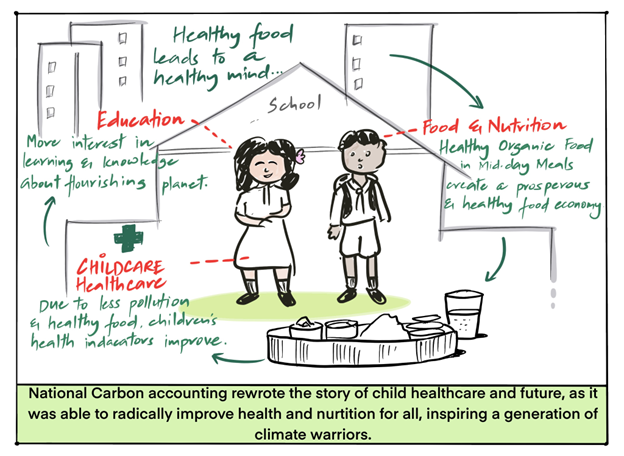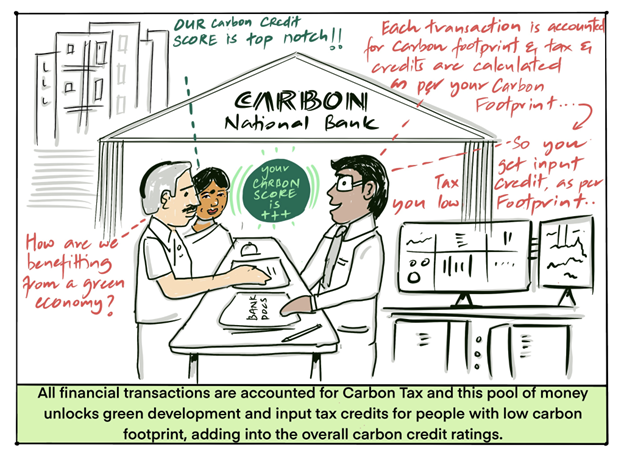Keeping tabs on carbon with an accounting system
Relevance
- GS Paper – 3, Environmental Pollution & Degradation.
- Tags: #CarbonAccounting #Nationalcarbonaccounting(NCA)system.
Why in the news?
- The ‘climate poly-crisis’ — a term made popular by Adam Tooze — refers to the interconnected and compounding crises related to climate change that are affecting the planet not just in a few sectors but across several sectors and domains.
- It encompasses the physical impacts of climate change (rising temperatures, sea level rise, and extreme weather events) and the social, economic, and political challenges that arise from these impacts.
In India
- Here, one can see the interconnections between seemingly different sectors such as energy, infrastructure, health, migration and food production that are being impacted by climate change.
- Recognizising the complexity and interconnectedness of the climate poly-crisis, it is crucial in developing a holistic approach that takes into account the diverse perspectives and priorities of different stakeholders, while ensuring resilience, equity, and justice.
- We need a deep transformation — one that lays the foundation of a new economy that is sensitive to the planet. Just as digital infrastructure enables new startups and public services, we need to imagine ‘carbon infrastructure’ that creates opportunities for a flourishing future carbon regime that takes the flows of carbon into account in the formulation of policy at every level: household, panchayat, district, State and country.
Measurement as the first step
- We need to measure carbon emissions from that of individual citizens to that of the nation as a whole, including all that is in the flow.
- Once we have a measurement system in place, we can build an accounting system that helps us balance our carbon books.
- Existing carbon accounting methodologies such as those championed by Karthik Ramanna at Oxford are already capable of tracking carbon balance sheets at the corporate level.
National carbon accounting (NCA) system
- It is both an evolutionary and a revolutionary generalization of these ideas. It will bring the entire nation, starting from individuals and households, under one carbon accounting framework.
- Imagine a world in which we file carbon tax returns alongside our income tax returns, or maybe only the carbon tax returns. Take a moment to consider the revolution in public finance that will be triggered when carbon is recognized, captured, valued, accounted for and taxed.
Carbon accounting
- ‘Money accounting’ is an integrated system, all the way from the spending of individuals to the Reserve Bank of India that helps us keep track of the circulation of money within the system. The keeping of accounts makes money visible and makes public finance possible.
- In contrast, the stocks and flows of carbon are not tracked at a granular level anywhere in the world. As a result, there is no possibility for a progressive carbon tax that penalises large buyers of petrol more than the average consumer.
- A progressive carbon tax requires us to keep track of the inflows and outflows of carbon, i.e., national carbon accounting. Carbon accounting is a way for companies to keep track of the carbon they are producing, removing, storing and offsetting. It helps companies keep carbon books alongside their financial books.
- An NCA will bring the concept of carbon books to the nation and will make it mandatory for businesses and individuals to declare/report their carbon inflows and outflows.
- It will make the circulation of carbon visible, and just as with financial accounting, other goods and services can be ‘financed’ using carbon surpluses, especially if there is convertibility between the carbon accounts and the rupee accounts.
A carbon GDP
- Once we have an NCA, we will be able to set targets, make predictions about future emission reductions and track our progress against those goals.
- We can speculate about a future national carbon budget that helps us reimagine the entire economy, including new technologies and new forms of collective action.
- Instead of the single goal of increasing economic GDP in money terms, as we already do, there will be a parallel goal of a carbon GDP which countries will try to reduce.
Way forward
- As a poly-solution An NCA will not only help India meet its commitment to becoming net zero by 2070 but also help it and other countries (if adopted globally) create new livelihoods and new forms of organizing its economy and society. Everyone understands GDP growth and, more recently, alternative measures such as Gross National Happiness (GNH).
- By making transparent the carbon footprint of human activities, we open up the possibilities of a new form of public discourse and an alignment between development and ecological sustainability. In short, an NCA is a poly-solution to the climate poly-crisis.
Source: The Hindu
Mains Question
What is the difference between carbon accounting and Carbon GDP? How carbon accounting is helpful in assessing environmental degradation? Also suggest measures to make environment sustainable.






